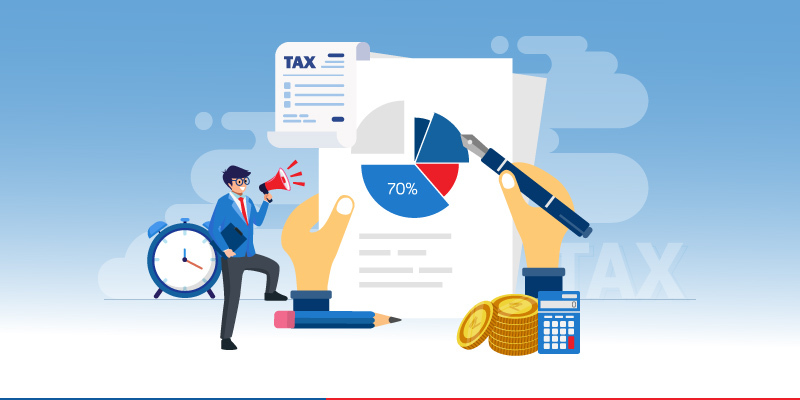What do you want to do?
Declaring and Submitting Proofs for Investments

In this policy, the investment risks in the investment portfolio is borne by the policyholder
For every salaried individual in India, declaring and submitting proof of investment to the employer is an essential practice. It is because of this process that the income tax payable is estimated correctly and the tax burden for the employee gets reduced through deductions under different sections of the Income Tax Act, 1961.
Let us understand the process step by step.
1. Declaration of Investment
The employer asks for the proposed investment declaration from the employee at the start of the financial year i.e estimate of investments that the employee is planning to make in the financial year. Based on the submitted estimated investment details , the employer calculates the estimated taxable income and consequent TDS amount to be deducted from salary. Towards the end of the financial year, the supporting proofs for the actual investments need to be submitted in Form 12BB,.
2. Components of the Declaration
The declaration includes details of:
- HRA wherein the employee is required to submit the rent and landlord’s details.
- Leave Travel concession wherein details of actual expenditure is to be submitted.
- Details of interest under the head "Income from house property" wherein details of lender is required to be submitted.
- Investments made for deduction under chapter VI-A i.e. section 80C,80CCC,80CCD, etc
The employee should submit the details as applicable to him.
3. The Process
Based on the proposed investment, the employer calculates the taxable income of the employee, taking into account the tax benefits applicable. Once the amount is determined, the TDS amount is calculated depending on the income tax slab. The TDS (if any) is deducted from the salary every month till the submission of investment proofs takes place. Based on the actual investment made, the TDS is re-calculated and the outstanding amount (if any) is adjusted accordingly.
4. Submission of proofs
The investment proofs need to be submitted to avail of the deductions subject to various sections of the Income Tax Act. These deductions on your taxable income can be enjoyed after you provide the supporting documents of investments made up to pre-specified limits.
However, no trouble awaits you if the proposed and actual investments don’t match. Here the taxable income is calculated taking into account the proofs of actual investments made. This final submission in the phase of December to January or any preferred time by the employer is used to cross-check and verify investments of the year and incorporate the tax deductions associated.
What if you fail to submit investment proofs?
Despite the declaration of the proposed investment, if you fail to submit investment proofs, the employer computes a higher taxable income again and accordingly will deduct TDS from your salary at a higher rate. This can be the situation if you do not invest or fail to upload or physically provide the investment documents.
1. Busting the tax-myth
Many believe that tax benefits are not available anymore if you do not submit the investment proofs to the employer. This is completely a myth. You can claim refund of the excess TDS deducted at the time of filing your income tax return.
Simply buy term insurance online or avail of the ULIP tax benefits by purchasing the policy closer to the time of return filing. Post that, claim the deduction amount as a refund, which you have already paid as TDS.
However, claiming a refund can be a hassle, as compared to getting the TDS deducted from your salary. Thus, it’s always a wise choice to make the investment declaration beforehand and submission of the relevant proofs on time.
Related Articles:
- Why and When Do I Need to Submit My Tax-Saving Investment Declarations?
- Investment proofs you need show in January to save TDS
- Best Tax Saving Investment Options
- How to File Income Tax Return?
- How to Save Income Tax? - Complete Guide
- Challan 280: How to Pay Your Income Tax Online with ITNS 280
ARN- INT/ED/11/23/6448
 Term Plan Articles
Term Plan Articles
 Investment Articles
Investment Articles
 Savings Articles
Savings Articles
 Life Insurance Articles
Life Insurance Articles
 Tax Articles
Tax Articles
 Retirement Articles
Retirement Articles
 ULIP Articles
ULIP Articles
Subscribe to get the latest articles directly in your inbox
 Health Plans Articles
Health Plans Articles
 Child Plans Articles
Child Plans Articles
 Popular Calculators
Popular Calculators
Here's all you should know about life insurance.
We help you to make informed insurance decisions for a lifetime.
HDFC Life
Reviewed by Life Insurance Experts
HDFC LIFE IS A TRUSTED LIFE INSURANCE PARTNER
We at HDFC Life are committed to offer innovative products and services that enable individuals live a ‘Life of Pride’. For over two decades we have been providing life insurance plans - protection, pension, savings, investment, annuity and health.
#Tax benefits & exemptions are subject to conditions of the Income Tax Act, 1961 and its provisions.
#Tax Laws are subject to change from time to time.
#The customer is requested to seek tax advice from his Chartered Accountant or personal tax advisor with respect to his personal tax liabilities under the Income-tax law.
The Unit Linked Insurance products do not offer any liquidity during the first five years of the contract. The policyholders will not be able to surrender or withdraw the monies invested in Unit Linked Insurance Products completely or partially till the end of fifth year
For more details on risk factors, associated terms and conditions and exclusions please read sales brochure carefully before concluding a sale. Unit Linked Life Insurance products are different from the traditional insurance products and are subject to the risk factors. The premium paid in Unit Linked Life Insurance policies are subject to investment risks associated with capital markets and the NAVs of the units may go up or down based on the performance of fund and factors influencing the capital market and the insured is responsible for his/her decisions. HDFC Life Insurance Company Limited is only the name of the Insurance Company, The name of the company, name of the contract does not in any way indicate the quality of the contract, its future prospects or returns. Please know the associated risks and the applicable charges, from your Insurance agent or the Intermediary or policy document of the insurer. The various funds offered under this contract are the names of the funds and do not in any way indicate the quality of these plans, their future prospects and returns.
*Past 5 Year performance of Discovery Fund and Data as of 30th June 2024. Past Performance is not indicative of future performance of the fund.
#Minimum investment amount is (Monthly ₹1000/30=₹34/day).

Popular Searches
- Term Insurance Calculator
- Investment Plans
- Investment Calculator
- Investment for Beginners
- Best Short Term Investments
- Best Long Term Investments
- 5 year Investment Plan
- savings plan
- ulip plan
- retirement plans
- health plans
- child insurance plans
- group insurance plans
- income tax calculator
- bmi calculator
- compound interest calculator
- income tax slab
- Income Tax Return
- what is term insurance
- Ulip vs SIP
- tax planning for salaried employees
- HRA Calculator
- Annuity From NPS
- Retirement Calculator
- Pension Calculator
- nps vs ppf
- short term investment plans
- safest investment options
- one time investment plans
- types of investments
- best investment options
- best investment options in India
- Term Insurance for Housewife
- Money Back Policy
- 1 Crore Term Insurance
- life Insurance policy
- NPS Calculator
- Savings Calculator
- life Insurance
- Gratuity Calculator
- Zero Cost Term Insurance
- critical illness insurance
- itc claim
- deductions under 80C
- section 80d
- Whole Life Insurance
- benefits of term insurance
- types of life insurance
- types of term insurance
- Benefits of Life Insurance
- Endowment Policy
- Term Insurance for NRI
- Term Insurance for Women
- Term Insurance for Self Employed
- Benefits of Health Insurance
- Health Insurance for Senior Citizens
- Health Insurance for NRI
- Best Term Insurance Plan for 1 Crore
- personal accident insurance
- Annuity Calculator
- Life Insurance Calculator
- buy term insurance




